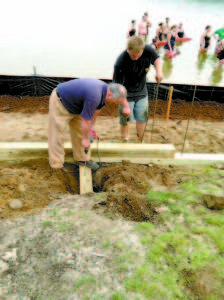Contractors get their hands dirty at Pleasant Lake Beach

WORKING ON THEIR CERTIFICATION — As a lifeguard class is taught behind them, contractors Gary Miller (drilling) and Clint Willey take part in a DEP certification course.
By Dawn De Busk
Staff Writer
CASCO — Some people update the skills and knowledge applicable to their field for career advancement.
Typically, this is a voluntary action.
In Maine, all individuals who work for companies doing earth work in the Shoreland Zone must complete a course from the Department of Environmental Protection (DEP).
This requirement is the law.
As of July 1, it is a violation to move even one cubic foot of earth in the Shoreland Zone without the proper certification.
“The training is two parts: In the classroom and then out in the field. They have to do a project that illustrates their knowledge of erosion control,†said Mike Morse, with the Bureau of Land and Water Quality in the DEP’s Portland office.
The purpose of the course is “To certify contractors in conjunction with the law. That took effect Jan. 1, 2013. There was a grace period,†Morse said.
In Casco, Code Enforcement Don Murphy said he contacted four local contractors and joined them in the DEP-led course in Portland. The class covers nonpoint source pollution and best management practices.
Later that week, the group got their hands dirty at Pleasant Lake’s town beach off Mayberry Hill Road.
Those contractors included Donny Warren with D&D Sealcoating and Striping; Clint Willey of R.N. Willey and Sons Excavating, Inc.; Bob Symons, an area builder; and general contractor Gary Miller.
According to Murphy, as part of the certification, the contractors chose an erosion-control project.
“We had erosion that was under the beach’s embankment. It has been a continuing problem, and difficult to fix,†Murphy said.
“We used landscape ties, erosion control bark mulch, and loam seed with hay,†he said.
“In front of the lake, we used a berm of erosion-controlling bark mulch,†he said.
“These were methods we learned in the all-day class we took in Portland,†Murphy said.
The men embarked on the hands-on project on June 26 and 27.
Lastly, an employee from the Cumberland County Soil and Water Conservation District came to inspect the work.
“The big thing is we had to show we were doing erosion and sediment control,†he said.
Murphy said the improvements are noticeably visible. The next step will be for the town to review the way the sidewalk and the road is laid out. It is likely the sidewalk will be modified in the future to mitigate runoff into the lake.
According to the DEP website, “Unlike point source pollution that can be traced back to a specific place such as a discharge pipe, nonpoint source pollution, or polluted stormwater runoff, often comes from a number of diffuse sources within a watershed.â€
“Stormwater runoff is water that doesn’t soak into the ground during a rainstorm and flows over the surface of the ground until it reaches a stream, lake, estuary, or the ocean. Stormwater runoff often picks up polluting hitchhikers such as soil, fertilizers, pesticides, manure, and petroleum products,†the DEP site said.
According to Murphy, for the past two years, DEP has extended the deadline for all contractors who work in the Shoreland Zone to comply with the two-part training.
“Technically, on July 1, if you are not certified you cannot work†in the Shoreland Zone, he said.
“You cannot disturb the ground, which includes putting in a septic system, repairing a wall, or any new home construction,†Murphy said.
For more information or to register for a course, contact DEP’s Nonpoint Source Training and Resource Center, 215-9237.

